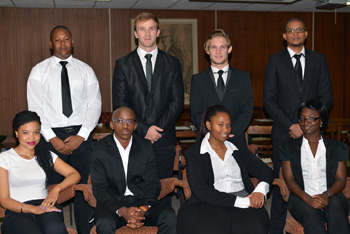
Front, from the left: Matshediso Tladi, Tumelo Lekhanya, Palesa Mafisa, Gabriel Dzeha, and;
Back, from the left: Emmanuel Mashele, Johnny Davis, Shelton Mellentze and Marvin Odendaal |
The Student Representative Council, together with the Faculty of Law and the Department of Student Affairs, has re-established the Student Court. This body will operate as a student administrative organ of the university, exercising its disciplinary powers as assigned to it in terms of its constitution and institutional delegations.
The Student Court is an independent body that will exercise its legal powers impartially with the aim of establishing a student community and a student governance culture committed to justice, equity, and accountability. The Court will decide on matters between students, student associations, or any part of the student body at the student level.
Newly-appointed judges and clerks are currently undergoing training in preparation for the court sessions which will begin in the second semester of 2015. The student court judges for this year are as follow:
- Palesa Mafisa
- Gabriela Dzeha
- Marvin Odendaal
- Emmanuel Mashele
- Johnny Davis
- Shelton Mellentze
- MatshedisoTladi
The student court clerk is Tumelo Lekhanya.